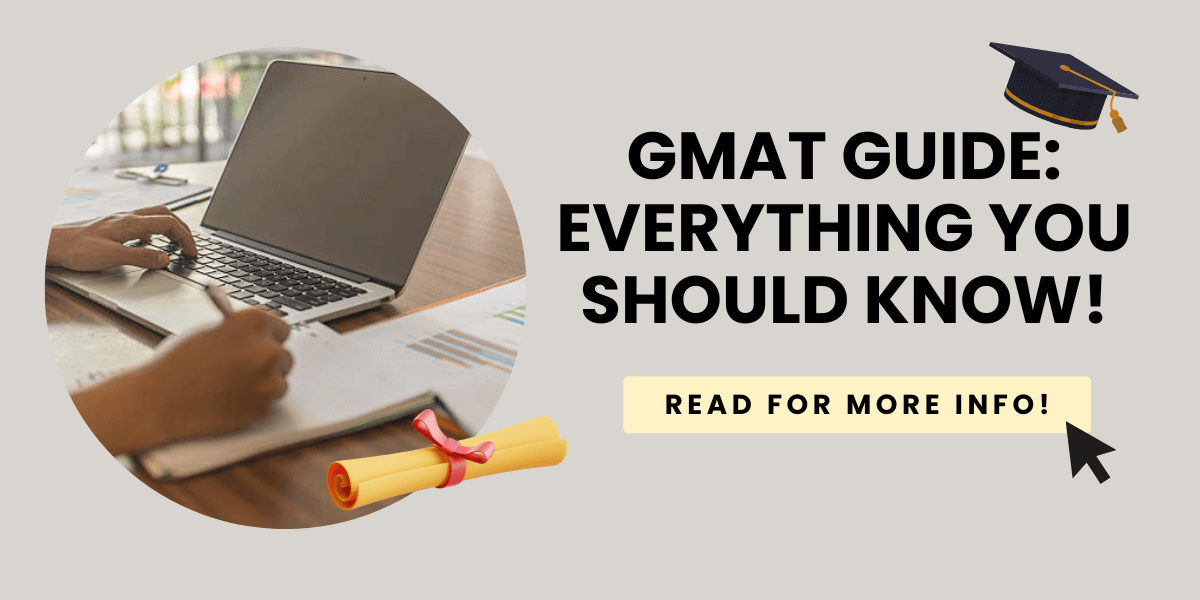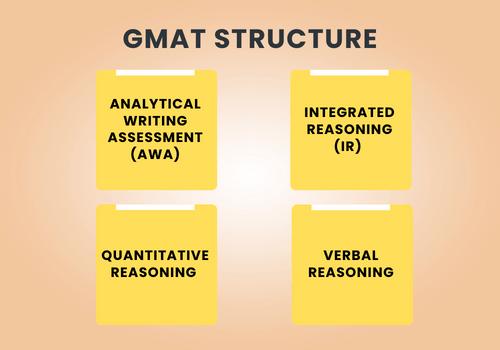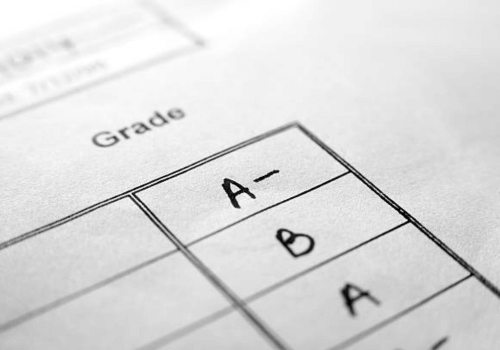GMAT Guide: Everything You Should Know!
August 28, 2023
Anis

The Graduate Management Admission Test (GMAT) is a crucial milestone for individuals who wish to pursue a graduate business degree, such as an MBA (Master of Business Administration).
It is a standardized assessment that evaluates analytical, quantitative, verbal, and integrated reasoning skills.
Therefore, it is a vital "component" of the business school application.
The GMAT helps admissions committees to assess the candidate's readiness for the academic rigors of a graduate program.
In this article, we will examine the key aspects of the GMAT, from its structure to effective preparation strategies.
GMAT Structure

The GMAT is structured to assess a candidate's skill in various skill areas.
The exam consists of four primary sections:
1. Analytical Writing Assessment (AWA)
This section evaluates your ability to analyze and communicate complex ideas critically.
You must write an essay responding to a prompt, showcasing your logical thinking and communication skills.
2. Integrated Reasoning (IR)
The IR section measures integrating data from different sources and solving complex problems.
It includes questions that involve multi-source reasoning, graphics interpretation, two-part analysis, and table analysis.
3. Quantitative Reasoning
This section tests mathematical and quantitative skills. The questions cover algebra, arithmetic, geometry, and data analysis.
The quantitative section evaluates the ability to reason quantitatively and solve real-world problems using mathematical concepts.
4. Verbal Reasoning
The verbal section evaluates your ability to comprehend written material, reason logically, and communicate effectively.
It includes questions on reading comprehension, critical reasoning, and sentence correction.
How Long For Each GMAT Session?
The total duration of the GMAT exam, including breaks, is approximately 3 hours and 30 minutes.
Here's a breakdown of the time allocation for each section:
1. Analytical Writing Assessment (AWA)
This section involves writing one essay responding to a prompt. You are given 30 minutes to complete this task.
2. Integrated Reasoning (IR)
The IR section assesses your ability to synthesize information from different sources and solve complex problems.
You have 30 minutes to answer 12 questions in various formats, such as multi-source reasoning, graphics interpretation, two-part analysis, and table analysis.
3. Quantitative Reasoning
This section evaluates your mathematical and quantitative skills.
You have 62 minutes to answer 31 questions that cover topics like algebra, arithmetic, geometry, and data analysis.
4. Verbal Reasoning
The verbal section assesses your reading comprehension, critical reasoning, and sentence correction skills.
You have 65 minutes to answer 36 questions.
GMAT Score
1. Analytical Writing Assessment (AWA)
Average scores range from 0 to 6 in half-point intervals.
AWA scores are computed separately from the scores for the multiple-choice sections of the exam.
The scores do not affect the Integrated Reasoning, Verbal, Quantitative, or Total GMAT scores.
AWA essays are scored using a combination of a machine algorithm and human essay raters.
All essays are scored using an electronic system that evaluates their structural and linguistic features, including organization of ideas, syntactic variety, and topical analysis.
Some essays are then randomly audited to ensure the algorithm's quality, consistency, and performance.
2. Integrated Reasoning (IR)
The Integrated Reasoning (IT) scores range from 1- 8 in single-digit intervals.
It is provided as a separate score and not included in the Total GMAT Score.
3. Quantitative Reasoning
Quantitative scores range from 6 to 51. It is included as part of the Total GMAT Score.
4. Verbal Reasoning
The Verbal Reasoning scores range from 6 to 51. It is included as part of the Total GMAT Score.
Failure to complete each section of the exam will result in a penalty.
If you do not complete the test in time, your scores will be calculated based on the number of questions answered.
Hence, the score will decrease significantly with each unanswered question.
GMAT Score Validity
GMAT Score is valid for a period of 5 years.
GMAT Retake
You can take the GMAT up to five times in a 12-month period, regardless of format.
For example, you could take it three times online and twice in person in 12 months, and that would be your five-test limit.
For pricing inquiries, refer here.
GMAT Registration In Malaysia
To take the GMAT exam in Malaysia, you must register through the official GMAT website and select a test center.
The test centers in Malaysia are located in major cities and educational hubs.
Hence, when registering, you can choose a test date and location that suits your schedule.
Test dates, locations, and availability may vary.
Therefore, you must plan and register for the exam well in advance to secure your preferred date and test center.
Preparation For GMAT
1. Don't be afraid of failure.

To prepare for the GMAT, it is important to experiment with different tips and methods to find what works best for you.
While many resources are available, giving yourself ample time to try different approaches and learn from failures is key to success.
Most people dedicate around three months to studying with minimal distractions before their deadline.
However, a personalized quiz can help determine a more accurate time frame.
Adding an extra month is recommended for experimentation and study without pressure.
2. Be familiar with the GMAT format.
You need to become familiar with the format and structure of the GMAT before beginning your preparation.
The exam is adaptive in nature and includes options in the Data Sufficiency section.
Paying close attention to the directions for this section is crucial, as the directions will not change on the day of the test.
Familiarizing yourself with the adaptive format can also be beneficial due to the GMAT's unique testing methodology.
3. Accuracy first!
GMAT is a timed test.
Due to this, many candidates make the biggest mistake from Day 1 of preparation.
Actually, you should balance between speed and accuracy.
The best way to find that balance is by separating and tackling these two aspects one at a time.
For instance, if you take 3 minutes to solve a practice question, rest assured.
Initially, you should focus on accuracy and ensure to obtain 80% - 90% during the practice session.
Once you have consistently hit the 80% - 90% accuracy mark, you should bring timing into the fray.
4. Be familiar with the GMAT concepts.
Although the GMAT may seem overwhelming, it assesses limited knowledge.
Indeed, it would be advantageous to understand every subject that could arise.
However, it would “disappoint” you to concentrate solely on a topic with a low probability of appearing in the quantitative section.
Instead, you should prioritize the most frequently tested topics in the verbal and quantitative sections.
5. Track your timing

You should be familiar with how much time you have to answer the questions for each section (total section time/number of questions per section).
Once you are confident about your accuracy, you should time yourself while doing the practice.
In addition to getting into a rhythm for timing, you should work on your stamina for prolonged focus since the GMAT is almost 4 hours.
For more time management and learning techniques, refer to the articles below:
The GMAT is a critical step on your journey to a graduate business degree.
By understanding the exam's structure and implementing effective preparation strategies, you can position yourself for success.
A strong GMAT score enhances their chances of admission. It reflects your readiness for the challenges of a graduate business program.
With thorough preparation and a positive mindset, you can conquer the GMAT and secure a promising future in business.
Kickstart your education in Malaysia
We'll help you find and apply for your dream university
You might be interested in...
- Global Learning at the Crossroads: Canada–Malaysia’s Evolving Education Partnership
- How AI is Powering the Next Wave of MSME Growth in Malaysia
- Malaysian Private Universities Making a Mark in Global Rankings
- Benchmarking Malaysian Private Universities Against Their ASEAN Peers
- Step-by-Step Guide to Applying to Malaysian Universities Online in 2025
- Fastest-Rising Malaysian Universities in the QS Rankings (2023‑2025)
- Sunway University Climbs to Global Top 500 in QS Rankings 2026
- Trusted by Top Universities: EasyUni’s Exclusive Visit to Sunway University
- Wawasan Open University and Sophic Automation Partner to Offer Work-Based Learning for Engineering Students
- Sunway University: Malaysia’s Best Cambridge A-Level College with 11 Years of Excellence
 +60173309581
+60173309581





